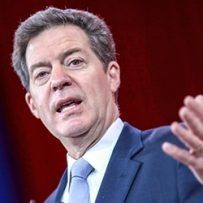 Update: The U.S. Senate confirmed Gov. Sam Brownback today as the U.S. Ambassador for International Religious Freedom.
Update: The U.S. Senate confirmed Gov. Sam Brownback today as the U.S. Ambassador for International Religious Freedom.
Vice President Mike Pence cast the tie-breaking vote as Democrats opposed Brownback for his Christian beliefs on the sanctity of life and marriage.
The U.S. came one step closer to having an Ambassador for International Religious Freedom — even as news broke of a Christian pastor found brutally killed in India after he tried to file a police complaint against Hindu extremists.
Gov. Sam Brownback’s nomination was approved last week by the Senate Foreign Relations Committee, and now goes to the full Senate.
President Trump nominated the former U.S. Senator and current Kansas Governor in July 2017. But Senate Democrats held up his nomination for political reasons. The president re-nominated him in early January.
Gov. Brownback has the highest stature of any previous person in that role, and a strong record on defending religious freedom.
“This job is really made for Sam. On all these issues he’s been there before almost anybody else,” former congressman Frank Wolf, a champion of religious freedom, told the Kansas City Star.
“All during his career in Congress, Sam was a leader on religious freedom,” Wolf told Christianity Today. “He was the first senator to go to Darfur during the genocide, and came back and spoke out to help the people of Sudan. He was also very active in working on issues of religious freedom in Egypt, China, and many other countries. At a time when, according to the Pew Research Center, we see growing religious persecution, I believe Sam Brownback is an outstanding appointment.”
The death of a Pentecostal pastor in Tamil Nadu, India, highlights the need for an experienced person leading U.S. efforts on religious freedom.
The body of Pastor Gideon Periyaswamy was found Saturday morning (Jan. 20) hanging from the thatched roof of his one-room house, a week after he complained to police about Hindu extremists, reported Morning Star News.
 His knees were bent stiff, as if he had been placed in the noose after his death.
His knees were bent stiff, as if he had been placed in the noose after his death.
The 43-year old pastor had converted from Hinduism 25 years ago, and served as a pastor over 12 years, his friend Azariah Reuben told Morning Star News. He and his congregation belong to a lower caste.
Local Hindu extremists had harassed Pastor Gideon every Sunday, and last year beat him. He had asked other pastors to pray about the Hindu hostilities, and once said, “I have no problem – if needed, if the Lord permits it, I would die as martyr for Christ, but the ministry should not stop.”
“We should be at peace with our neighbors — let’s not give them a reason to fight,” he told his congregation.
The police initially refused look into the Pastor’s death.
India’s prime minister Narendra Modi and his Bharatiya Janata Party (BJP) tout Hindu nationalist extremism and were linked to riots and violence against religious minorities when he was a governor. Modi is the only person to have been denied a U.S. visa and barred from the U.S. under the International Religious Freedom Act.
The U.S. elevated religious freedom as a key element of international relations in 1998 specifically to address religious persecution. The International Religious Freedom Act created an office in the State Department to promote religious freedom as a core objective of U.S. foreign policy. It is led by the Ambassador-at-Large for International Religious Freedom.
The department investigates and reports on persecution, recommends policies and develops programs, meets with foreign governments, works with non-government groups, and reaches out to religious communities. The law requires the U.S. punish violators of religious freedom, but gives the president flexibility ranging from shunning to sanctions.
Congress expanded the legislation in 2016, after then-president Obama had downgraded the issue and ambassador’s role.
The Frank R. Wolf International Religious Freedom Act of 2016 passed the same week that Islamic State bombed a Coptic Christian church in Cairo that killed 28 people. It:
Elevates the ambassador’s position to directly under the Secretary of State.
Establishes an “entities of particular concern” (in addition to the “countries of particular concern”) for non-government perpetrators like Islamic State (IS) and Boko Haram.
Creates a “designated persons list” of violators and authorizes the president to sanctions those who participate in persecution.
Creates a list religious prisoners around the world.
Mandates all foreign service officers be trained in religious liberty.
“Religious freedom is the first freedom. The choice of what you do with your own soul,” tweeted Brownback when he was nominated. “I am honored to serve such an important cause.”
